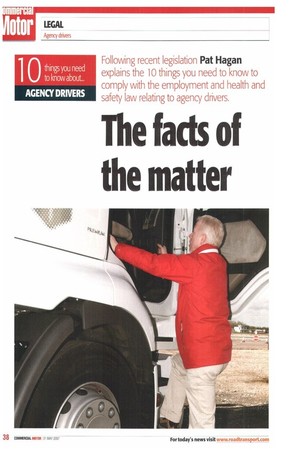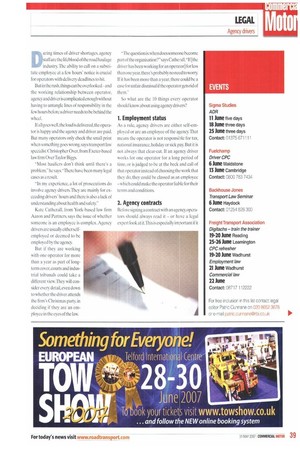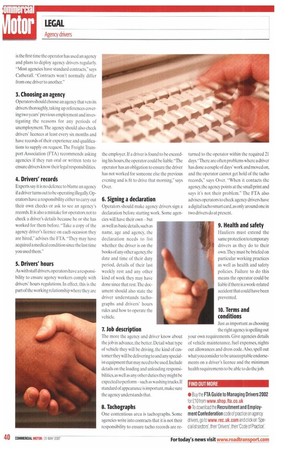The fads of the matter
Page 38

Page 39

Page 40

If you've noticed an error in this article please click here to report it so we can fix it.
Following recent legislation Pat Hagan explains the 10 things you need to know to comply with the employment and health and safety law relating to agency drivers.
uring times of driver shortages, agency staff are the lifeblood of the road haulage industry. The ability to call on a substitute employee at a few hours' notice is crucial for operators with delivery deadlines to hit.
But in the rush,things can be overlooked—and the working relationship between operator, agency and driver is complicated enough without having to untangle lines of responsibility in the few hours before a driver needs to be behind the wheel.
If all goes well,the load is delivered,the operator is happy and the agency and driver are paid. But many operators only check the small print when something goes wrong, says transport law specialist Christopher Over, from Exeter-based law firm Over Taylor Biggs.
"Most hauliers don't think until there's a problem,he says. 'There have been many legal cases as a result.
"In my experience, a lot of prosecutions do involve agency drivers. They are mainly for exceeding drivers' hours and there is also a lack of understanding about health and safety" Kate Catherall, from York-based law firm Aaron and Partners, says the issue of whether someone is an employee is complex. Agency drivers are usually either selfemployed or deemed to be employed by the agency But if they are working with one operator for more than a year as part of longterm cover, courts and industrial tribunals could take a different view-. They will consider every detail, even down to whether the driver attends the firm's Christmas party. in deciding if they are an employee in the eyes of the law. "The question is: when does someone become part of the organisation?" says Catherall." If [the driver has been working for an operator] for less than one year, there's probably no need to worry. [fit has been more than a year, there could be a case for unfair dismissal if the operator gets rid of them."
So what are the 10 things every operator should know about using agency drivers?
1. Employment status
As a rule, agency drivers are either self-employed or are an employee of the agency. That means the operator is not responsible for tax, national insurance, holiday or sick pay. But it is not always that clear-cut. If an agency driver works for one operator for a long period of time, or is judged to be at the beck and call of that operator instead of choosing the work that they do, they could be classed as an employee —which could make the operator liable for their terms and conditions.
2. Agency contracts
Before signing a contract with an agency, operators should always read it — or have a legal expert look at it.This is especially important if it is the first time the operator has used an agency and plans to deploy agency drivers regularly. "Most agencies have standard contracts," says Catherall. -Contracts won't normally differ from one driver to another."
3. Choosing an agency
Operators should choose an agency that vets its drivers thoroughly, taking up references covering two years' previous employment and investigating the reasons for any periods of unemployment. The agency should also check drivers' licences at least every six months and have records of their experience and qualifications to supply on request. The Freight Transport Association (PTA) recommends asking agencies if they run oral or written tests to ensure drivers know their legal responsibilities.
4. Drivers' records
Experts say it is no defence to blame an agency if a driver turns out to be operating illegally. Operators have a responsibility either to carry out their own checks or ask to see an agency's records. It is also a mistake for operators not to check a driver's details because he or she has worked for them before. "Take a copy of the agency driver's licence on each occasion they are hired," advises the ETA. "They may have acquired a medical condition since the last time you used them."
5. Drivers' hours
As with staff drivers,operators have a responsibility to ensure agency workers comply with drivers' hours regulations. In effect, this is the part of the working relationship where they are the employer. If a driver is found to be exceeding his hours, the operator could be liable."The operator has an obligation to ensure the driver has not worked for someone else the previous evening and is fit to drive that morning," says Over.
6. Signing a declaration
Operators should make agency drivers sign a declaration before starting work. Some agencies will have their own but as well as basic details, such as name, age and agency, the declaration needs to list whether the driver is on the books of any other agency, the date and time of their duty period, details of their last weekly rest and any other kind of work they may have done since that rest. The document should also state the driver understands tachographs and drivers' hours rules and how to operate the vehicle.
7. Job description
The more the agency and driver know about the job in advance, the better. Detail what type of vehicle they will be driving, the kind of customer they will be delivering to and any specialist equipment that may need to be used. Include details on the loading and unloading responsibilities,as well as any other duties they might be expected to performsuch as washing trucks. If standard of appearance is important,make sure the agency understands that.
8. Tachographs
One contentious area is tachographs. Some agencies write into contracts that it is not their responsibility to ensure tacho records are re turned to the operator within the required 21 days. 'There are often problems where a driver has done a couple of days' work and moved on, and the operator cannot get hold of the tacho records,says Over. "When it contacts the agency the agency points at the small print and says it's not their problem." The FTA also advises operators to check agency drivers have a digital tacho smart card, as only around one in two drivers do at present.
9. Health and safety
Hauliers must extend the same protection to temporary drivers as they do to their own.They must be briefed on particular working practices as well as health and safety policies. Failure to do this means the operator could be liable if there is a work-related accident that could have been prevented.
10. Terms and conditions
Just as important as choosing the right agency is spelling out your own requirements. Give agencies details of vehicle maintenance, fuel expenses, nights out allowances and dress code. Also, spell out what you consider to be unacceptable endorsements on a driver's licence and the minimum health requirements to be able to do the job.






















































































































































































